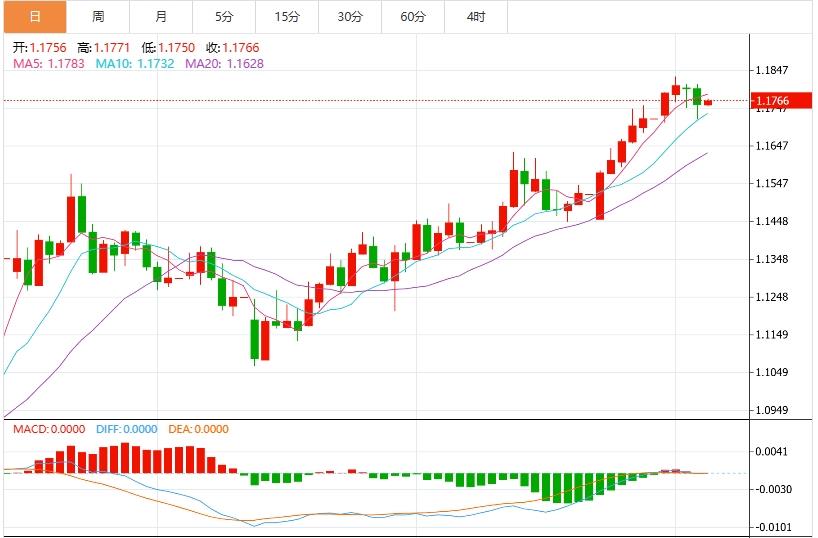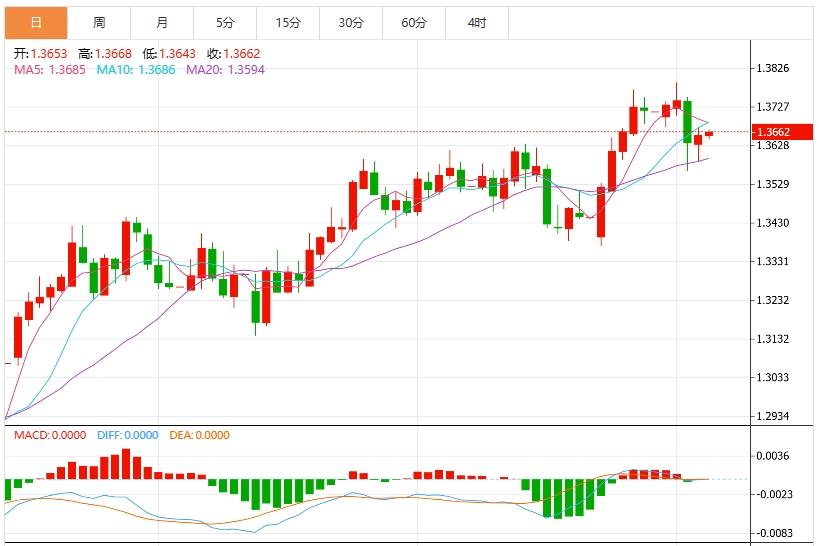Trusted by over 15 Million Traders
The Most Awarded Broker
for a Reason
market news
Non-farm report extinguishes hopes of interest rate cuts in July, US bonds and US dollar shock
Wonderful introduction:
A person's happiness may be false, and a group of people's happiness cannot tell whether it is true or false. They squandered their youth and wished they could burn it all, and that posture was like a carnival before the end of the world.
Hello everyone, today XM Foreign Exchange will bring you "[XM Foreign Exchange Official Website]: The non-agricultural report strongly extinguishes the hope of a interest rate cut in July, and the US bonds and US dollar shocked greatly." Hope it will be helpful to you! The original content is as follows:
On Friday, the U.S. dollar index continued to fall, with the U.S. dollar rising against major currencies such as the yen, the euro and the Swiss franc on Thursday, after data showed that the U.S. economy created more jobs than expected, suggesting that the Fed may take longer to cut interest rates. The dollar rose 0.94% against the yen to 145.075 yen and rose 0.39% against the Swiss franc to 0.7955 CHF. The US dollar is expected to rise against the two safe-haven currencies for the second consecutive trading day. The euro fell 0.41% to $1.175,350, a second straight day of decline.
Analysis of major currency trends
Dollar: As of press time, the U.S. dollar index hovered around 97.02, with the U.S. dollar (USD) slightly rising on Thursday as stronger-than-expected non-farm employment data in June eased concerns about the labor market. The optimistic report helped the dollar get rid of years of lows, and traders reassessed the possibility of the Fed's rate cut in July. Technically, the US dollar index (DXY) has recently broken through a downward wedge pattern. After the breakout, the index is currently hovering between about 96.40 and 97.15, indicating that the selling is temporarily suspended. The index is now trying to rebound slightly and appears to be retesting the lower boundary of the cracked wedge near 96.80-97.00. This area that once served as support is now used as resistance. The index is still trading below the 9-day index moving average (EMA) below 97.25, strengthening the bearish layout unless buyers can regain that level with strong momentum.



1. Canadian Treasury Secretary: There will be no more digital taxes when it can negotiate an optimal trade agreement with the United States
Canadian Treasury Secretary Francois Philippe said that the country can negotiate a better trade agreement with the Trump administration than other countries, refuting the claim that Canada may have to accept new benchmark tariffs on all exports to the United States. Philippe said: "We import more from the United States than Japan, the United Kingdom and France www.xmh100.combined, so we are not in the same camp as other countries. North America's www.xmh100.competitiveness depends on the relationship between Canada and the United States. Canada has a wealth of key minerals and energy, the supply chains of the two countries are deeply integrated, and Canada is the largest supplier of aluminum in the United States." Regarding the digital service tax, Philippe denied the claim that the tax may be reintroduced in the future.
2. The "Big and American" bill was passed. Biden and Harris spoke out successively for criticism.
Former US President Biden posted a post on the social media platform "X" that criticized Trump for his "Big and American" tax and expenditure bill. Biden said the Republican budget bill is not only reckless, but also cruel. It cuts Medicaid and takes away millionsAmerican health care. It closed rural hospitals and cut food aid to veterans and seniors. It raises energy bills and can also lead to a significant reduction in Medicare, while increasing the deficit by $4 trillion. All of this is to give billionaires a massive tax cut. Former Vice President Harris also said Republicans in Congress voted to destroy millions of people across our country - kicking Americans out of health care, closing hospitals, canceling food aid and raising costs.
3. Becente denied that the decline in the US dollar threatened its status as a major currency in the world
U.S. Treasury Secretary Becente refuted the claim that the recent depreciation of the US dollar will affect its status as a major currency in the world. "The dollar price has nothing to do with a strong dollar policy. The key to a strong dollar policy is whether we take measures in the long run to ensure that the dollar continues to be a global reserve currency." He believes that the Trump administration is indeed taking such measures. The U.S. dollar index fell nearly 11% in the first half of the year, marking its worst first-half performance since 1973. This devaluation occurs in the context of concerns about Trump’s administration’s policies, especially the potential shock to economic growth by tariff increases and a tough diplomatic stance on long-term allies who have been injecting money into the United States in the past. Becente said the Republican tax bill "creates conditions for economic growth."
4. Fed Bostic: The U.S. economy may experience longer high inflation
Feder Bostic said Thursday that high U.S. inflation may last for a period of time, which may penetrate into consumer psychology, and that it may take a year or more to adapt to the changes in trade and other policies. This suggests a reason to be patient before a rate cut. "The main conclusion is that price and broader economic adjustments to U.S. trade and other upcoming policies, as well as geopolitical developments, will not be short and simple one-time price changes as standard textbook models suggest," he said. "Instead, this looks increasingly like a process that may take a year or more to end www.xmh100.completely." "If I'm right, the U.S. economy may experience longer high inflation," Bostic said. "I don't expect prices to soar sharply, but steadily," which could penetrate consumer inflation expectations and present greater challenges to the Fed. He also said that non-farm data released on Thursday showed that new jobs exceeded expectations, with the unemployment rate slightly lowering to 4.1%, "labor market conditions remain healthy overall" and there are no signs of worsening that a preemptive rate cut may be needed. He said that the current high uncertainty in the direction of employment, economic growth and inflation is "not the time for a major change in monetary policy", and he believes that the current wait-and-see attitude of FOMC is still appropriate.
5. The non-agricultural report strongly extinguished the hope of a rate cut in July, and the US dollar shook sharply
Analyst Roseanne Briggen said that the employment data in June exceeded expectations in all aspects: non-agricultural employment growth far exceeded forecasts.The unemployment rate fell unexpectedly. The market responded quickly: Treasury bond prices plunged, overnight index swaps (OIS) interest rates soared, overnight financing rate (SOFR) futures plummeted, and the yield curve showed a "bear flat" trend. The dollar rose sharply as the possibility of interest rate cuts in July almost hit zero. The latest pricing of federal funds futures shows that the probability of interest rate cuts in July has plummeted from 25% before the data was released to 4%. However, after economists analyzed the details of the report in depth, it was found that state and local government jobs increased by 73,000 (mainly the education industry), while federal government jobs decreased by 7,000, and private sector jobs grew less than expected - but the overall labor market remained strong, providing a sufficient basis for the Federal Reserve to keep interest rates unchanged.
Institutional View
1. CICC: Non-agricultural resilience does not support the Federal Reserve's early interest rate cuts
CICC research report stated that the United States added 147,000 non-agricultural employment in June, exceeding the market expectations of 110,000, and the unemployment rate fell from 4.2% to 4.1%, indicating that the labor market is still resilient. Although tariff uncertainty reduces labor demand, labor supply has also slowed down as deportation immigration policies strengthen, which has curbed the rise in unemployment. In addition, there may be skills mismatch in the labor market: on the one hand, government layoffs and the rapid development of artificial intelligence have led to a "white-collar over-the-collar worker"; on the other hand, tightening immigration policies have led to a continued shortage of low-skilled jobs. Under this structural mismatch, the unemployment rate may not necessarily increase significantly in the future. We believe that the non-farm data in June does not support the Fed's early interest rate cut. We maintain our previous judgment that the next rate cut may have to wait until the fourth quarter, that is, after the price increase caused by tariffs has passed.
2. Deutsche Bank: It is not surprising that the US dollar has "indifferent" to reach a trade agreement. Thu Lan Nguyen, head of foreign exchange and www.xmh100.commodity research at Deutsche Bank, pointed out that the US government announced a trade agreement with Vietnam yesterday. At first glance, this seems to be a victory for the US government, but only if it agrees with the logic that "suppressing import attraction through tariffs is economical." I deeply doubt this. In addition to a large number of consumer goods, Vietnam exports to the United States also include coffee and other goods. Regardless of whether the United States can quickly increase the production capacity of textiles (the main export category of Vietnam), coffee alone is difficult to replace - after all, the United States (except Hawaii) does not have the climate conditions suitable for coffee cultivation at all. Therefore, the conclusion is obvious: even if the tariffs are no longer outrageously high, import tariffs may still do more harm than good. What's more, Vietnam's economy is limited in size and lacks sufficient purchasing power to significantly increase U.S. imports. It is no surprise that the US dollar did not strengthen due to news of the agreement yesterday. 3. Dutch International: Concerns about a stronger euro seem to be too much
Dutch International Group analyst Chris Turner said in a report that a stronger euro is good for the euro's economy, despite speculation that ECB officials are increasingly worried about the appreciation of the euro. These concerns are that a stronger euro will lower import prices, reduce inflation, and make the euro zoneExporting products is more expensive. However, the eurozone should take advantage of this "global euro moment", as the ECB president has praised previously. Reconfiguring global portfolios into the euro zone “will only benefit the private sector’s borrowing costs.”
The above content is all about "[XM Forex Official Website]: The non-agricultural report strongly extinguishes hope for a interest rate cut in July, and the US dollar shocks greatly". It is carefully www.xmh100.compiled and edited by the XM Forex editor. I hope it will be helpful to your transactions! Thanks for the support!
After doing something, there will always be experience and lessons. In order to facilitate future work, we must analyze, study, summarize and concentrate the experience and lessons of previous work, and raise it to the theoretical level to understand it.
Disclaimers: XM Group only provides execution services and access permissions for online trading platforms, and allows individuals to view and/or use the website or the content provided on the website, but has no intention of making any changes or extensions, nor will it change or extend its services and access permissions. All access and usage permissions will be subject to the following terms and conditions: (i) Terms and conditions; (ii) Risk warning; And (iii) a complete disclaimer. Please note that all information provided on the website is for general informational purposes only. In addition, the content of all XM online trading platforms does not constitute, and cannot be used for any unauthorized financial market trading invitations and/or invitations. Financial market transactions pose significant risks to your investment capital.
All materials published on online trading platforms are only intended for educational/informational purposes and do not include or should be considered for financial, investment tax, or trading related consulting and advice, or transaction price records, or any financial product or non invitation related trading offers or invitations.
All content provided by XM and third-party suppliers on this website, including opinions, news, research, analysis, prices, other information, and third-party website links, remains unchanged and is provided as general market commentary rather than investment advice. All materials published on online trading platforms are only for educational/informational purposes and do not include or should be considered as applicable to financial, investment tax, or trading related advice and recommendations, or transaction price records, or any financial product or non invitation related financial offers or invitations. Please ensure that you have read and fully understood the information on XM's non independent investment research tips and risk warnings. For more details, please click here
CATEGORIES
News
- 【XM Group】--ETH/USD Forecast: Ethereum Pulls Back Against FOMC Backdrop
- 【XM Group】--Dax Forecast: DAX Continues to Find Buyers on Dips in Bullish Run
- 【XM Forex】--USD/TRY Forecast: Rises on Lira Weakness and Inflation Strategy
- 【XM Forex】--Nasdaq Forecast: Continues to Grind Back and Forth
- 【XM Market Review】--USD/JPY Forecast: Bulls Reclaim Key Levels

































































































